Amanda Margo
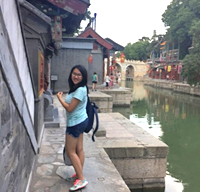 Even though being in China for a month had many challenges and overwhelming moments, I was able to appreciate other things besides the language through the different activities that were planned. An activity that I enjoyed greatly was visiting the different kinds of churches in Tianjin.
Even though being in China for a month had many challenges and overwhelming moments, I was able to appreciate other things besides the language through the different activities that were planned. An activity that I enjoyed greatly was visiting the different kinds of churches in Tianjin.
Caitlyn Fong
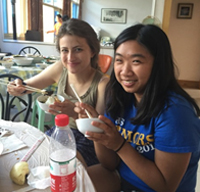 I was humbled to not judge based on what I thought was right because no culture is “right”; they are just unique. Chinese culture is extremely different from American culture, and maybe they can even be considered opposites, but that is what makes the world an interesting place.
I was humbled to not judge based on what I thought was right because no culture is “right”; they are just unique. Chinese culture is extremely different from American culture, and maybe they can even be considered opposites, but that is what makes the world an interesting place.
This program was my first study abroad experience, and overall, my time in China is something I will remember forever; not only because of what I experienced here, but also because of how those experiences have influenced the way I view the cultures around me. Wheaton in China was more than studying Chinese. It went beyond just learning the language; it immersed me in a new culture and showed me the beauty of diversity, and additionally encouraged me to take risks and go out of my comfort zone.
Callie Riel
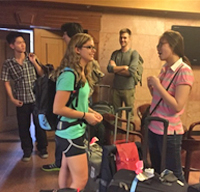 Language-wise, I believe that my listening improved above anything else. The first Saturday that I arrived, I drove to my host home with my Chinese mother and older sister. In the car, they both asked me extremely simple questions, but I couldn’t answer them even though I knew all the words. However, at the end of the trip, I had a conversation in Chinese with the man sitting next to me in the plane on the way to Mongolia. He asked me similar questions – where I was from, why I had been in China, what I was doing in Mongolia, etc. I was able to understand and answer almost all of his questions.
Language-wise, I believe that my listening improved above anything else. The first Saturday that I arrived, I drove to my host home with my Chinese mother and older sister. In the car, they both asked me extremely simple questions, but I couldn’t answer them even though I knew all the words. However, at the end of the trip, I had a conversation in Chinese with the man sitting next to me in the plane on the way to Mongolia. He asked me similar questions – where I was from, why I had been in China, what I was doing in Mongolia, etc. I was able to understand and answer almost all of his questions.
One thing that was enlightening and rather discouraging was the student’s questions about foreigners at the lecture. I realized that no matter how much Mandarin and Chinese culture I learn, I will always be a foreigner, and that will always be a barrier to me when trying to share the gospel. I will have to try especially hard to make sure that I am communicating the gospel with humility, and that I don’t ever appear to think that my culture and practices are better than theirs.
Daniel Cerrato
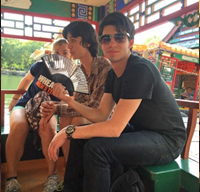 To sum up everything, I want to reflect on the reason why I think China is a place of high context culture and then compare this reason to American culture. One of the highest priorities of individuals in China is to maintain harmony. That being said, if directness is viewed as rude and too confrontational, then it is inevitable that China will be a society where often times people will not say what they truly mean, leaving it up to the person on the receiving end to infer the actual meaning.
To sum up everything, I want to reflect on the reason why I think China is a place of high context culture and then compare this reason to American culture. One of the highest priorities of individuals in China is to maintain harmony. That being said, if directness is viewed as rude and too confrontational, then it is inevitable that China will be a society where often times people will not say what they truly mean, leaving it up to the person on the receiving end to infer the actual meaning.
Ian Kilpatrick
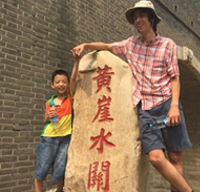 If I learned one thing on this trip, it’s that the key for me is to take off all my lenses when looking at China. I think that is what the trip D-I-E project was intended to teach us–describe a phenomenon instead of immediately making a judgment. For the first three weeks or so, I viewed China and the Chinese in terms of my own experience and culture. I believe this is normal, and I can bring a valuable perspective to Chinese culture. However, I would often think critically about what I was seeing rather than just seeing it. I evaluated as I observed, filing each phenomenon into categories: good, bad, annoying, interesting, better than in America, worse than in America, rude, kind. These lenses are initially a helpful paradigm through which to process my experiences.
If I learned one thing on this trip, it’s that the key for me is to take off all my lenses when looking at China. I think that is what the trip D-I-E project was intended to teach us–describe a phenomenon instead of immediately making a judgment. For the first three weeks or so, I viewed China and the Chinese in terms of my own experience and culture. I believe this is normal, and I can bring a valuable perspective to Chinese culture. However, I would often think critically about what I was seeing rather than just seeing it. I evaluated as I observed, filing each phenomenon into categories: good, bad, annoying, interesting, better than in America, worse than in America, rude, kind. These lenses are initially a helpful paradigm through which to process my experiences.
Equally dangerous is the deception that I suddenly understand Chinese culture—sure, there’s a lot I don’t know, but I’ve got a pretty good handle on the big concepts, right? No! This is called being wise in one’s own eyes, and will hinder me from perceiving the depth and nuance of China. Because of this trip, I believe that anyone who has the means to experience another culture should. It’s humbling to realize that my way of thinking is not the standard for the rest of the world. As I made brief eye contact with an old peasant lady on the Great Wall, two disparate lives intersected —East and West, young and old, with completely foreign stories, thoughts, and dreams. There are billions of people with lives, dreams, and stories very different than mine, and it humbles you to interact with them.
I didn’t feel Chinese in China, but neither did I feel completely American when I returned home. This trip has given me a new perspective on the world, on America and China, and on myself; I wrestle every day with the cultural tension I feel. I no longer view my home in California as the axis or standard for the rest of the world, but as another place on the globe. What’s more, I feel a love for the nation of China, for the people of China on the mainland and abroad. I grow more certain that they are the people to whom God has called me. I praise the Lord Jesus for this opportunity to go to China, and I trust that He will lead me back soon.
Jeff Hill
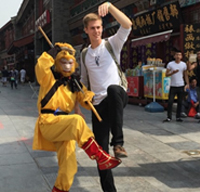 A topic I honestly did not really approach China in mind with was Christianity. I was fascinated with the setting China provides for the faith, and may be the aspect of the trip I will remember the most (hard to tell still so soon after). The view I witness was that China is opening itself up quite quickly to Christianity. To be fair while in China we were surrounded by a disproportionate amount of Christians, heard their testimonies, and attended services. But where as for a long time China has been closed to Christianity as a western religion, many aspects of the culture seem to in fact favor acceptance of it.
A topic I honestly did not really approach China in mind with was Christianity. I was fascinated with the setting China provides for the faith, and may be the aspect of the trip I will remember the most (hard to tell still so soon after). The view I witness was that China is opening itself up quite quickly to Christianity. To be fair while in China we were surrounded by a disproportionate amount of Christians, heard their testimonies, and attended services. But where as for a long time China has been closed to Christianity as a western religion, many aspects of the culture seem to in fact favor acceptance of it.
Josiah Pederson
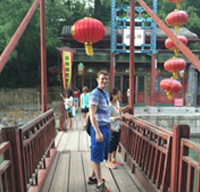 In just a few days I will be going to work at a Summer English program at Calvin College for international students coming to the States to learn English. I will be an RTA (RA/TA) and the vast majority of the students are Chinese. Having gone on the Wheaton in China trip, I will be able to communicate and relate to the students far better than I would have without this incredible language and cultural learning experience. Even if I did not learn very many new words, my listening and speaking skill and confidence have skyrocketed and that will carry through to my job this summer, my classes next year, and the rest of my time of learning Chinese.
In just a few days I will be going to work at a Summer English program at Calvin College for international students coming to the States to learn English. I will be an RTA (RA/TA) and the vast majority of the students are Chinese. Having gone on the Wheaton in China trip, I will be able to communicate and relate to the students far better than I would have without this incredible language and cultural learning experience. Even if I did not learn very many new words, my listening and speaking skill and confidence have skyrocketed and that will carry through to my job this summer, my classes next year, and the rest of my time of learning Chinese.
Kathryn Jancaus
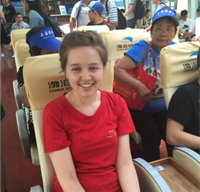 I want to keep up friendships with the Chinese friends I made in Tianjin–those friendships are sweet and I really value them. I especially treasure the opportunities we had to become friends with our Christian brothers and sisters in China. The connection we felt with them is the strongest evidence in my mind that friendship can cross cultural divides; specifically, this was friendship based in the love of God, and that love isn’t stopped by any boundaries in the world. While the challenges of experiencing a different culture were greater than I thought they’d be during this study abroad in Tianjin, the opportunities that I had to learn and make friends were also richer than I expected, and I am so thankful to remember the experience.
I want to keep up friendships with the Chinese friends I made in Tianjin–those friendships are sweet and I really value them. I especially treasure the opportunities we had to become friends with our Christian brothers and sisters in China. The connection we felt with them is the strongest evidence in my mind that friendship can cross cultural divides; specifically, this was friendship based in the love of God, and that love isn’t stopped by any boundaries in the world. While the challenges of experiencing a different culture were greater than I thought they’d be during this study abroad in Tianjin, the opportunities that I had to learn and make friends were also richer than I expected, and I am so thankful to remember the experience.
Melissa Gray
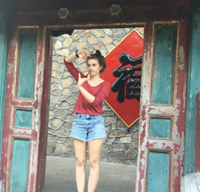 It feels impossible to sum up my experience studying in China. Not only have I grown personally and gained self-confidence through my ability to communicate with others using a new language, I have grown closer to other Wheaton students and also learned about the experiences and culture of new Chinese friends. This experience has grown my trust in God and trust in other people as I've relied on them during my trip. My personal faith and global perspective has also grown as I've learned about the experiences of others. I have renewed motivation to study Chinese and learn even more. I know that the new perspective I've gained from this trip will help me understand others and myself better and act in a more Christ-like manner.
It feels impossible to sum up my experience studying in China. Not only have I grown personally and gained self-confidence through my ability to communicate with others using a new language, I have grown closer to other Wheaton students and also learned about the experiences and culture of new Chinese friends. This experience has grown my trust in God and trust in other people as I've relied on them during my trip. My personal faith and global perspective has also grown as I've learned about the experiences of others. I have renewed motivation to study Chinese and learn even more. I know that the new perspective I've gained from this trip will help me understand others and myself better and act in a more Christ-like manner.
Nate Ruble
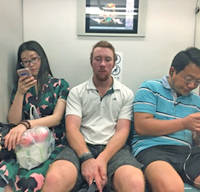 Through the time abroad in China, I believe that one of the most valuable things I gained was the recognition of how my personal expectations clashed with the reality of living in China. While in Tianjin I experienced situations in which time, relationships, education, and even ways of looking at truth were handled in ways that were very different from what my American background would have me believe was correct. I believe that this experience abroad broadened my thinking and helped me grow in learning to let go of my assumptions and embrace the unexpected.
Through the time abroad in China, I believe that one of the most valuable things I gained was the recognition of how my personal expectations clashed with the reality of living in China. While in Tianjin I experienced situations in which time, relationships, education, and even ways of looking at truth were handled in ways that were very different from what my American background would have me believe was correct. I believe that this experience abroad broadened my thinking and helped me grow in learning to let go of my assumptions and embrace the unexpected.
In addition to the concept of time, relationship, and education, I discovered possibly the biggest aspect of Chinese culture that clashed with my personal presuppositions–the idea of truth. Through lectures and discussion with Dr. Holtrop I came to understand how narrow my view of truth might be. In the Western view, truth is a concrete, intransitive, fact-based concept. In the Eastern view, truth is more of a relationship-based idea. Truth is that which builds up relationship, not necessarily something that is factual in the way that American definitions may maintain. This concept that the way that I look at truth, and by extension the way I look at the Bible, may be limited by my American culture blew my mind. I had come to China expecting only to learn more about Chinese language and culture and had not anticipated coming away with a more defined view of truth in the American worldview, yet that is what happened.
